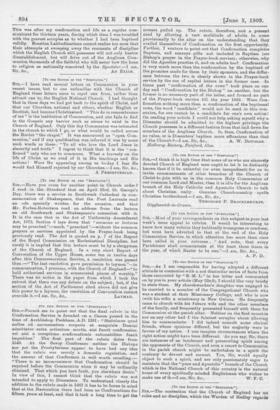[TO TUR Horron or TUN u flPIICIA.T011.]
SIR,—Permit me to point out that the final rubric in the Confirmation Service is founded on a Canon passed in the time of Archbishop Peckham, A.D. 1281 : " Statuimus quod nullus ad saoramentum corporis et sanguinis Domini admittatur extra articulum mortis, nisi merit confirmatus, vel nisi a receptions confirmationis rationabiliter fuerit impeditus." The first part of the rubric dates from 1519. At the Savoy Conference neither the Bishops nor yet the Presbyterians appear to have had any idea that the rubric was merely a domestic regulation, and the answer of that Conference is well worth recalling :— " There is no inconvenience that Confirmation should be required before the Communion when it may be ordinarily obtained. That which you here fault, you elsewhere desire." In view of this, I cannot think that the rubric was not intended to apply to Dissenters. To understand clearly the addition to the rubric made in 1662 it has to be borne in mind that at the Restoration there had been no Confirmations for fifteen years at least, and that it took a long time to get the arrears pulled up. The rubric, therefore, met a present need by allowing a vast multitude of adults to come provisionally to the altar on the understanding that they availed themselves of Confirmation on the first opportunity. Further, I venture to point out that Confirmation completes Baptism, and conveys gifts not included in Baptism (see Bishop's prayer in the Prayer-book service); otherwise, why did the Apostles practise it, and on adults too P Confirmation is very much more than the confirmation by the baptised of the promises made for them by their sponsors, and the differ- ence between the two is clearly shown in the Prayer-book service by the use of capital letters in the former case. In times past "confirmation of the vows" took place on one day and "Confirmation by the Bishop" on another, but the former is no necessary part of the latter, and formed no part of the Prayer-book service till the year 1662. Were Con- firmation nothing more than a confirmation of the baptismal vows, the word "candidate" would not be used in this con- nexion, for one cannot be a candidate for one's own action! On reading your article I could not help asking myself why a Dissenter should be admitted to the highest privilege the Churoh possesses in a different fashion from that laid down for members of the Anglican Church. Is, then, Confirmation of no value, or is Dissenters' baptism more efficacious than that










































 Previous page
Previous page